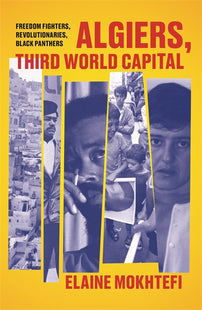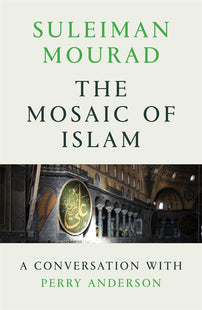Last Month in France: An Islamophobia Diary
On the 10th November, around 13,500 people marched through Paris to demand an end to anti-Muslim speech, discrimination against Muslim women, and anti-Muslim violence in French politics and society. Yet, the month leading up to the demonstration, as Musab Younis charts in this article, showed just how deep Islamophobia runs in contemporary France.

On October 12, Julien Odoul, an official from the National Rally party (Rassemblement National, formerly National Front), interrupted a French regional council session to ask a woman in the audience to either remove her headscarf or leave. She was a volunteer accompanying children on a school trip. ‘Madame has ample time to wear her veil at home, on the street,’ Odoul said. ‘But not here, not today.’ The National Rally officials stormed out. A journalist captured a photograph of the woman comforting her young son, who was one of the children on the school trip. Later, in an interview, she said: 'They destroyed my life.'
On October 13, France’s national education minister, Jean-Michel Blanquer, said headscarves are 'not desirable in our society'.
On October 14, Yves Threard, the deputy editor of France's oldest daily newspaper, Le Figaro, said on the television debate show Le Grand Soir that he 'hates the Muslim religion,' and that he once got off a bus because he saw a veiled woman on it.
The same day, the president of the Republicans party (Les Républicans), Christian Jacob, said: ‘It shocks me that we accept that a veiled person can accompany children on school trips.’
(The word voile and its corresponding adjective voilé, ‘veiled’, are used in France to refer to anything a Muslim woman might wear on her head. What is being referred to is almost always in fact a headscarf, or foulard.)
On October 15, Bruno Le Maire, Minister of the Economy and Finance, said he ‘considers that the Islamic veil is not the desirable future of French culture and society.’
On October 16, on the television show 9h Galzi, the journalist Olivier Galzi compared the veil to a Nazi SS uniform.
On October 18, on the television show C à vous, the philosopher Alain Finkielkraut said 'the hijab is not France.'
On October 19, several hundred people demonstrated at Place de La République in Paris against what Clémentine Autain, a politician from France Unbowed (La France Insoumise), called 'the winds of Islamophobia that are sweeping across our country.'
On October 20, on the television show Le Grand Jury, Marine Le Pen, leader of the National Rally, said: ‘I want the veil to be banned in the entirety of public space.’
On October 23, on the television show CNews, the writer and journalist Eric Zemmour referenced a prominent French general involved in the conquest of Algeria in the 1840s. ‘When General Bugeaud arrives in Algeria, he begins to slaughter Muslims, and even some Jews,’ said Zemmour. ‘Well, I am today on the side of General Bugeaud. That’s what it is it to be French.’
On October 24, Claude Habib, a feminist author and professor of literature, wrote in Le Figaro that ‘The veil is so shocking in France because it opposes our culture of gallantry.’ Such gallantry, she added, is defined by its ‘playful, light, eroticised’ nature, which is ‘inconceivable in the Islamic world’ and ‘is misunderstood in the Anglo-Saxon world.’
On October 25, President Emmanuel Macron gave a twelve-page interview to Valeurs Actuelles, a far-right magazine, which was fined 3,000 euros by a Parisian court in 2015 for 'the provocation of discrimination, hate or violence towards Roma people'. In the interview, he explained that he was 'obsessed' with immigration. 'My goal is to throw out everybody who has no reason to be here,' he said. What did he think of the demonstration against Islamophobia that had been held six days earlier? It was 'non-aligned Third Worldism with a whiff of Marxism'.
On October 28, a man tried to set fire to a mosque in Bayonne and then shot and seriously injured two Muslim men who confronted him. The alleged terrorist, Claude Sinke, 84, is a former 2015 local election candidate for the National Front, the party that became National Rally. He got 17.4 percent of the vote.
On October 29, the French Senate passed an amendment banning ‘the wearing of religious symbols’ for adults accompanying children on school trips. The amendment is unlikely to pass the lower house.
During that debate, the senator Jean-Louis Masson compared veiled women to ‘witches’. He also said: ‘If they’re not happy, they can go back to where they came from.’
The same day, 200 Malian migrants were evicted from the Foyer Bara in the Paris suburb of Montreuil. Their expulsion was timed to take place two days before la trêve hivernale, when evictions become illegal due to the cold weather.
On November 1, over fifty public figures signed an open letter in support of a demonstration in Paris that would demand an end to anti-Muslim speech, discrimination against Muslim women, anti-Muslim violence, and 'abusive statements against Muslims from the highest level of the State.' Signatories included Jean-Luc Mélenchon, the leader of France Unbowed; Benoît Hamon, the former leader of the Socialist Party (PS); David Cormand, national secretary of the Green Party (EELV); and journalists like Edwy Plenel and Rokhaya Diallo.
Under pressure, the signatories soon began to cave in. Yannick Jadot, from the Green Party (EELV), discovered he had issues with the letter. 'I have never considered there to be state racism in our country,' he said. François Ruffin, a filmmaker and journalist associated with France Unbowed, said he hadn't read the text properly because he was 'eating waffles with my children' and that he couldn't go to the demonstration because he was playing football on that day. Jean-Luc Mélenchon said he would not have used the term Islamophobia 'so as not to give impression of banning criticism of a religion.' He has previously said 'the veil is a sign of submission' and the burqa is a 'fundamentalist provocation against the Republic.'
The national secretary of the Communist Party (PCF), Fabien Roussel, did not sign the letter, saying that he found the term Islamophobia 'reductive'. The Socialist Party (PS) did not sign the letter, saying: 'We do not recognise ourselves in its slogans.' Last year, fourteen ministers, nine state secretaries and two former Presidents attended a demonstration in Paris against antisemitism, called by the Socialist Party (PS) and backed by about twenty other parties.
A friend who works at a software company in Paris told me that a Muslim receptionist was made to remove her headscarf after a complaint from one of her male colleagues, who has previously sexually harassed several receptionists. Another friend tells me that she can live in France because, although her parents are Algerian, she has an ambiguous-sounding name and can pass for white. But she knows others who aren’t so lucky with their names. They are looking to move to Canada or Belgium. A friend who moved to Paris from London recently made a hire at his company and passed on the details of the successful candidate, a Moroccan woman, for formal approval. 'She's not veiled, is she?' he was asked.
On November 6, the French Prime Minister, Édouard Philippe, said the government wants to 'regain control' over its immigration policy.
The same day, in an interview with Causer magazine, the philosopher Alain Finkielkraut said: ‘A progressive Islamisation of ever larger portions of French territory is underway.’
On November 7, a platoon of police officers cleared a migrant camp housing over 1,000 people at Porte de La Chapelle in northern Paris.
On November 10, the day of the demonstration, the newspaper Le Parisien ran a special front-page investigation 'into 40 years of Islamist terrorism', underneath which it prominently listed public figures who might be participating in the march. Aurore Bergé, spokesperson for Macron's La République en Marche party in the National Assembly, tweeted that it was a 'demonstration of shame' organised by those who wanted to 'fight for a political Islam.' Marine Le Pen declared that 'all those who go to this demonstration will be hand in hand with Islamists'.
The cortège marched slowly from Gare du Nord to Nation, a distance of about three miles, singing in soldarity with Muslim women, asking the Republic to protect Muslims from attacks, declaring: 'laïcité, we love you', mocking Jean-Michel Blanquer. Le Monde estimated there were 13,500 people. Mélenchon did good on his promise to show up. It was initially thought Hamon wasn’t there; then he was sighted in the crowd, a baseball cap pulled low over his face. Other nationally prominent politicians stayed away. Demonstrations in Paris typically draw people to their balconies on the apartments overlooking the main roads. This time the windows were mostly shut, the blinds pointedly drawn. At one point, out of nowhere, a woman in a housekeeper's uniform swung open the windows of a hotel room and danced. The crowd was elated.
On Twitter, attendees tweeted pictures of the crowds using the hashtag #Marche10Novembre. Across France, others took advantage of the hashtag to express alternative views. 'I'm not racist, but ...' began one.
M. Younis, 13 November
To donate to the Comité Justice et Libertés pour tous (CJL), which organises against racism in France, click here.
Musab Younis lives in Paris
[book-strip index="1" style="display"]



